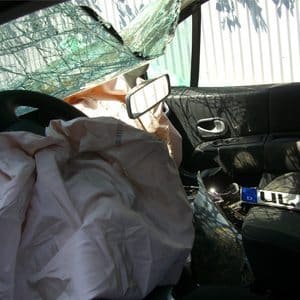Product liability cases are brought against manufacturers, marketers, and salespeople after consumers are injured by defective products. Many experts have high hopes for these Takata airbag recall lawsuits, that they'll increase public awareness of dangers and force companies to take more care in making things safe. 
But as the scandal surrounding Japanese manufacturer Takata's deadly airbag continues, it's become clear that confidential settlements are muddying the waters, rather than protecting anyone's rights.
Product liability is actually one of America's most secretive legal domains. Many large companies pressure injury victims into settling quickly out of court. They're able to do this precisely because of their size, with lots of money and costly legal counsel.
Faced by seemingly insurmountable odds, a plaintiff's lawyer can easily crack under the pressure, foregoing a trial and opting for quick money up-front. Sometimes, that's the best option. But almost all settlement agreements include a confidentiality clause, which limits or eliminates either party's ability to speak out on the facts of the case.
This is standard practice in product liability law. But there are two problems:
Longtime consumer safety advocate and sometime presidential candidate Ralph Nader had this to say: "There's a lot there that escapes NHTSA (the National Highway Traffic Safety Administration), escapes Congress, escapes the media, escapes the consumer groups. The best information is usually coming out of product-liability suits, but they're settling out. There haven't been any public trials yet."
Nader's point is clear: liability suits are often the only way for policy-makers to gain a comprehensive understanding of a product's defect. Without publicly-released information, it's hard for anyone to see the problem clearly, which makes addressing it nearly impossible.
Nader didn't mention other plaintiffs in his list of people impaired by confidentiality, but he might as well have. Previous cases are an essential resource for attorneys representing injured people. Court is often the only venue in which manufacturers feel enough pressure to provide clear answers. Without those answers from Takata, many victims of the company's negligence are left in the dark.
Without details, lawyers have a hard time determining the viability of potential cases. This problem is particularly acute in Takata's case. We know that their airbag is defective, but we don't know-how. It could be a defect that occurred in the manufacturing process, which would only affect a portion of the airbags, or it could be endemic to the product's design. If so, every Takata airbag is inherently faulty, and millions of more drivers may be in danger.
Confidential settlements also make it impossible for attorneys to value cases. If the amount recovered is less than the cost of conducting a lawsuit, it's not worth it to start in the first place. But we don't know that much, which means many personal injury lawyers have shied away from cases that could be perfectly justified.
While the dangers inherent in Takata's airbag have only come to public attention recently, the company itself has been aware for some time. In fact, plaintiffs have been filing lawsuits for at least the last four years. All have settled with confidentiality agreements, which goes some way to explain why the problem was never made public. One plaintiff's lawyer even went so far as to say: "They wanted to resolve this immediately[...] It almost seemed like they were going to pay us off to shut us up."
Takata is currently sitting on a grand jury subpoena, which legally requires them to explain their airbag's defect in full. But just this Wednesday, December 3rd, 2014, Takata refused to extend their airbag's recall, in spite of demands from the National Highway Traffic Safety Administration. Congress continues to push for full transparency and has convened public hearings that could help force wider recalls.
These hearings will most likely include testimony from actual injury victims, but the NHTSA would have to file suit against Takata to legally enforce a recall. For their part, certain auto manufacturers, including Honda and Ford, have agreed to extend their own recall of vehicles with Takata airbags.
At least 5 drivers have been killed by Takata's exploding airbag, and hundreds more injured.
Under increased industry scrutiny, and considerable legislative pressure, Takata has decided to shuffle its upper management.
Stefan Stocker, the company's President and CEO is stepping down from both positions, but will continue as an executive director. He's also accepted a 30% decrease in salary, although the hardship is only expected to last four months. Current chairman, and grandson of the company's founder, Shigehisa Takada will take Stocker's place as CEO, but has to swallow an even larger paycut of 50%.
According to Fortune Magazine, Takata has explained that the changes will "unify the company's response to the recall." Whether that response actually involves addressing the problem through widened recalls is anyone's guess.
Read related articles: Teen Wins Lawsuit Against John Deere & Her Own Father